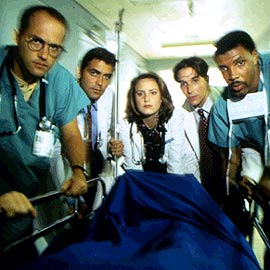The National Capital Medical Center -- Better Health Care or just one more example of the Edifice Complex?
The current issue of TheMail, the great e-newsletter from DCWatch, has an excellent piece about the proposed National Capital Medical Center to be located in the area formerly known as Reservation 13.
Eric Rosenthal writes--
1) The National Capital Medical Center is not needed. No one has shown that there is a shortage of trauma, emergency or hospital services in DC. Washington has near-universal health insurance coverage, and DC residents already have access to plenty of emergency rooms and hospitals; in fact, we use them at twice the national rate. Where are the Washington citizens in need of hospital beds who can’t get them? There aren’t any.
2) Improving health should be our goal, and the National Capital Medical Center would not improve health. If rates of emergency room visits and hospitalizations lead to good health, Washington would be the healthiest city in the country. Unfortunately, we are last in the nation in most health measures from premature birth to life expectancy. The health problems we have will not be fixed by yet another hospital. Chronic disease is what ails us, conditions that respond well to outpatient prevention. We must focus on what really causes our terrible rates of disease and premature death and then look for solutions to the problems we actually have. If we did, we likely would find that accessible, quality outpatient care could improve health, but the proposed center would not.
3) The National Capital Medical Center will become a financial quagmire and divert funds and attention from programs that could improve health. (...)
This is another example of planning without asking the most important questions before coming up with the solution. (This reminds me of my joke about Congress--"Oh your foot hurts? I know what to do, we'll cut off your leg.")
That question should be: How can we best assist residents of the District of Columbia in being safe and secure (and able to be assisted when needed) in terms of health, wellness, and health care?
That is the question that needs to be answered, and a system developed in response to the goals and objectives that get developed out of that question.

Most DC Hospitals lose money. So does the Prince George's County Hospital, which should be thought of as a DC hospital in some respects. Most people use emergency rooms as their primary health care facility. Yet that is an inefficient and ineffective way to obtain health care. Plus, it's very expensive.
Wellness care is different from the care needed when people are very sick.
Health insurance programs were created not to ensure health, but to provide regularized income streams to hospitals during the Depression.
Pandering won't make people feel better if they are sick, although they might feel better politically.
In any case, shouldn't we really take this opportunity to address the real question, and come up with answers that truly solve the "problems".
I fear that the whole Reinventing Government movement has fallen by the wayside.



0 Comments:
Post a Comment
<< Home